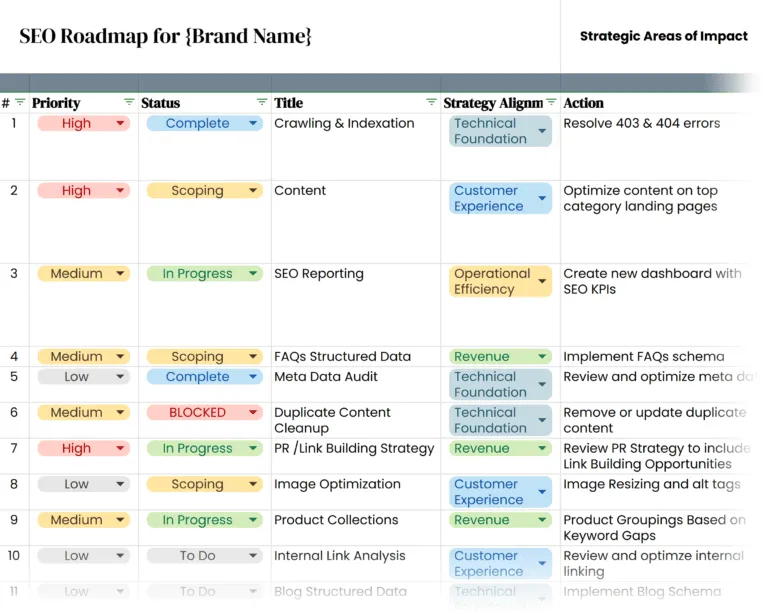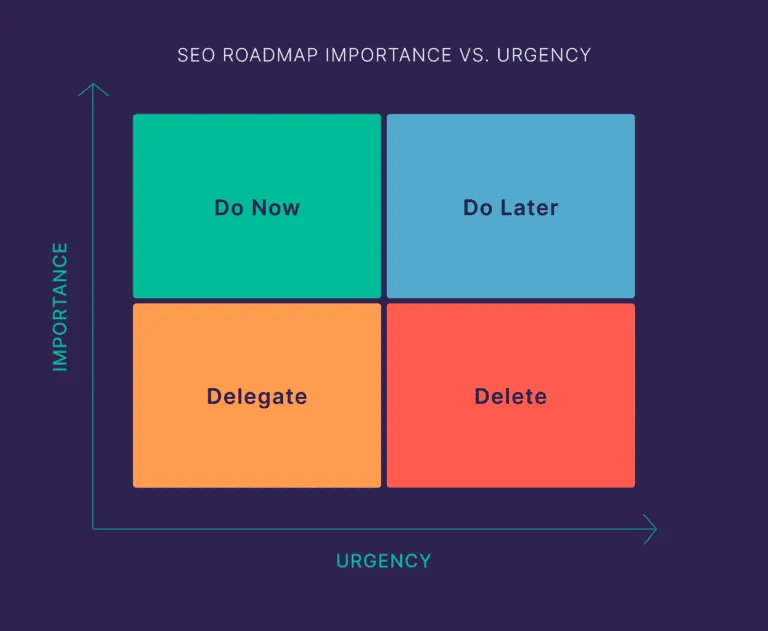Introduction
In today’s digital world, having a strong SEO strategy is key for businesses to get noticed online and draw in customers. It doesn’t matter if you’re just starting or have been around for years.
Creating a solid SEO roadmap can open up new opportunities for your website.Moreover, this guide will walk you through the basic steps to make an SEO roadmap that boosts your brand and brings real results.
Key Takeaways
- Firstly, understand the importance of SEO for your business and the benefits of a well-executed SEO strategy
- Whenever, learn how to conduct thorough keyword research to identify your target audience and analyze competitor keywords
- Discover the essential steps to build an roadmap that aligns with your business goals
- Explore on-page optimization tactics to optimize content and enhance user experience
- Uncover off-page optimization strategies to boost your website’s authority and visibility
- Then, implement effective tracking and analysis methods to measure the success of your SEO roadmap
- Adapt your SEO roadmap based on performance metrics and continuously improve your strategy
Understanding the Importance of SEO
In today’s digital world, the importance of search engine optimization is huge. More people use search engines to find products, services, and info.
Having a strong online presence is key for businesses of all sizes. SEO helps drive organic traffic to your site, boosts brand visibility, and increases leads and sales.
Why SEO Matters for Your Business
SEO is more than just a trend. It’s a key strategy that can greatly help your business succeed. By making your website and content search engine friendly, you’re more likely to show up in top search results.
This means more potential customers will find and connect with your brand. This leads to more targeted traffic and more conversions and revenue.
The Benefits of a Well-Executed SEO Strategy
Having a strong strategy brings many benefits to your business. Some main advantages include:
- Better search engine rankings mean more people can find and access your site.
- SEO makes your site easier and more enjoyable for users, matching their needs.
- Search Engine Optimization helps your site grow over time, bringing in steady organic traffic.
- Search Engine is a cost-effective way to market, cheaper than paid ads.
- It gives deep insights into what your audience searches for, helping your business strategy.
Understanding the benefits and impact on your business helps you make better choices for your digital marketing. This can open up new paths for growth and success.
Laying the Foundation: Keyword Research
Starting a strong plan begins with thorough keyword research. This key step helps you find the search terms your audience uses. It gives you insights to shape your content and optimization.
Identifying Your Target Audience
Knowing who you’re talking to is key for keyword research. By looking at their search habits, age, and what they need, you find the best keywords. This way, you make content that really speaks to them, boosting your search engine rank.
Analyzing Competitor Keywords
Looking at what your competitors use can help yours. You learn what keywords they focus on and see where you can stand out. This also shows you long-tail keywords and topics others might miss, letting you grab more market share.
| Keyword Research Strategies | Benefits |
| Utilizing keyword research tools | Uncover relevant, high-volume keywords with low competition |
| Analyzing search intent | Understand the user’s underlying motivation and tailor content accordingly |
| Monitoring competitor keyword usage | Identify opportunities to outrank competitors and capture more market share |

Build an SEO Roadmap: Step-by-Step
Creating a strong roadmap is key for businesses wanting to boost their online visibility and draw in more traffic. By using a step-by-step approach, you can make a detailed plan that fits your company’s goals.
Let’s look at the main steps to make your SEO roadmap and implement your strategy.
- Define Your SEO Goals: Start by setting clear SEO goals. Are you trying to get higher search engine rankings, increase website visitors, or generate more leads? Make sure your goals are specific, measurable, achievable, relevant, and time-bound (SMART) to help guide your roadmap development.
- Conduct Keyword Research: Find the target keywords your audience is looking for. Look at search volume, competition, and how relevant they are to your business. Pick the best keywords that match your business and plan.
- Audit Your Website: Do a full SEO audit to see how your website is doing now. Find technical problems, content gaps, and chances to improve. This will help shape your roadmap and guide your strategy implementation.
- Develop an Action Plan: With your goals, keyword research, and website audit in mind, make a detailed action plan. List the specific steps you’ll take, like on-page optimization, creating content, building links, and technical tweaks. Set timelines, who’s responsible for each task, and what KPIs to watch.
- Execute and Measure: Stick to your SEO roadmap and keep an eye on how it’s doing. Watch your KPIs, look at the data, and tweak your strategy as needed. Keeping up with strategy implementation and optimization is key to reaching your goals.
By following these steps, you can make a thorough SEO roadmap that matches your business aims. It will help guide your plan creation and implementation. Stay flexible, adapt to new market trends, and keep refining your SEO strategy to make the most of your online presence.
| Step | Description |
| Define Goals | Set SMART objectives to guide your SEO roadmap |
| Conduct Keyword Research | Find target keywords with high search volume and relevance |
| Audit Your Website | Check the current state of your website and find ways to improve |
| Develop an Action Plan | Make a detailed SEO action plan with specific tactics, timelines, and KPIs |
| Execute and Measure | Put your SEO roadmap into action, track results, and adjust as needed |

On-Page Optimization Tactics
Effective on-page SEO is key to a strong online presence. By making your content better for target keywords and improving the user experience, you can increase your website’s search engine rankings. This brings in more qualified traffic. We’ll look at the main on-page optimization tactics you should use.
Optimizing Content for Target Keywords
Keyword optimization means putting your target keywords into your web content in a smart way. First, do thorough keyword research to find the best and most effective terms. Then, add these keywords into your page titles, meta descriptions, headings, and body text.
This approach helps search engines understand your content’s relevance. It also makes your content easy and enjoyable to read.
Enhancing User Experience
Search engines like websites that give users a good experience. By focusing on on-page, content optimization, and user experience optimization, you can make a site that’s good for both search engines and your visitors.
This means making sure your site loads fast, works well on mobile, has clear navigation, and has engaging content.
Off-Page Optimization Strategies
Off-page tactics are key in SEO, working alongside your on-page efforts. On-page focuses on making your website’s content and structure better. Off-page SEO looks at outside factors that can change your search engine rankings.
Link building is a major off-page strategy. Getting backlinks from trusted and relevant sites can boost your domain authority and visibility. A strong backlink profile shows search engines your content is valuable and should rank higher.
External factors for search engine rankings also matter. These include social media, brand mentions, and industry citations. By watching and using these signals, you can improve your off-page and search engine position.
- Develop a detailed link building plan to get quality backlinks
- Keep an eye on and boost your backlink profile to increase your domain authority
- Use external factors for search engine rankings, like social media and industry mentions
- Combine off-page tactics with your on-page efforts for a complete plan
Using these off-page strategies can help you make the most of your efforts. It can bring your website more visibility and success online.

Measuring and Adjusting Your SEO Roadmap
Creating an roadmap is just the start of your online success journey. To keep your strategy strong, you must always measure and tweak it with new data. By tracking key SEO metrics and changing your approach, you can make your strategy work better.
Tracking and Analyzing Key Metrics
Success in SEO starts with watching and understanding the right metrics. Important metrics to keep an eye on include:
- Organic traffic: Keep track of how many visitors come to your site from search engines.
- Search engine rankings: Watch where your site ranks for key words on big search engines.
- Conversion rates: See how well your is helping you get the actions you want, like sales or sign-ups.
- Backlink profile: Check how many and what kind of links point to your site, important for search engines.
Continuous Improvement and Adaptation
With a clear view of your SEO performance, you can tweak your roadmap. Using data to make decisions helps you improve your strategy optimization. This keeps your SEO roadmap measurement in line with your business goals.
Here are some areas to always work on:
- Content optimization: Make your content more relevant to what your audience is searching for.
- Technical SEO: Fix any technical problems that might be hiding your site from search engines.
- Link building: Grow and improve your backlinks through smart partnerships and outreach.
- Keyword research: Keep an eye on and update your keywords to stay on top of trends and competition.
By always SEO metrics tracking and adjusting your roadmap measurement, your SEO stays sharp, effective, and in line with your business goals.
| SEO Metric | Description | Importance |
| Organic Traffic | The number of visitors arriving at your website through search engines | Shows how well your SEO is working to bring in qualified traffic |
| Search Engine Rankings | Your website’s position for target keywords on major search platforms | Tells you how well your content is doing in search results and if users can find your site |
| Conversion Rate | The percentage of visitors who take a desired action on your website | Checks the quality of your SEO traffic and its effect on your business goals |
| Backlink Profile | The quantity and quality of incoming links to your website | Shows search engines your site’s authority and trustworthiness, key for rankings |

Conclusion
In this guide, we’ve covered the key steps to build a strong SEO roadmap for beginners. We’ve looked at why SEO is important and how it can help your business. We also discussed how to do keyword research and use on-page and off-page optimization.
This guide showed us the importance of a detailed roadmap. It highlighted the need for making decisions based on data and always improving. By using the steps we’ve learned, you can make your website better, draw in more visitors, and boost your business’s success.
Remember, SEO is a continuous effort. Always keep an eye on your progress, check important metrics, and change your plans if needed. With hard work and a desire to learn, you can keep improving your SEO roadmap. This will help your business succeed in the changing digital world.
FAQs
What is the purpose of an SEO roadmap?
An SEO roadmap is a detailed plan. It outlines steps and tactics to boost your website’s visibility and ranking. It acts as a guide to help you meet your SEO goals and grow your business over time.
How do I identify my target audience for keyword research?
To find your target audience, first understand who your ideal customers are. Know their problems and what they look for online. This helps you pick relevant keywords that match their searches, making your SEO efforts more effective.
What are the key on-page optimization tactics I should focus on?
Key on-page tactics include optimizing content with target keywords, improving user experience, speeding up your site, and making it mobile-friendly. These steps help search engines understand and index your site better, boosting your rankings and visibility.
How do I measure the success of my SEO roadmap?
Track important metrics like organic traffic, search rankings, bounce rate, and conversion rates to measure your SEO roadmap’s success. Always analyze your data to spot areas for improvement and adjust your strategy as needed.
What is the role of off-page optimization in my SEO roadmap?
Off-page optimization, like building quality backlinks and improving domain authority, greatly affects your search rankings. Using off-page tactics boosts your site’s credibility and trustworthiness with search engines. This leads to better visibility and more organic traffic.
Related Posts
How to Build Abs? Here Is How To Train Them
Effective Methods to Read WhatsApp Encrypted Messages
How to Use ChatGPT to Write a Cover Letter


2 thoughts on “How to Build an SEO Roadmap for Beginners”